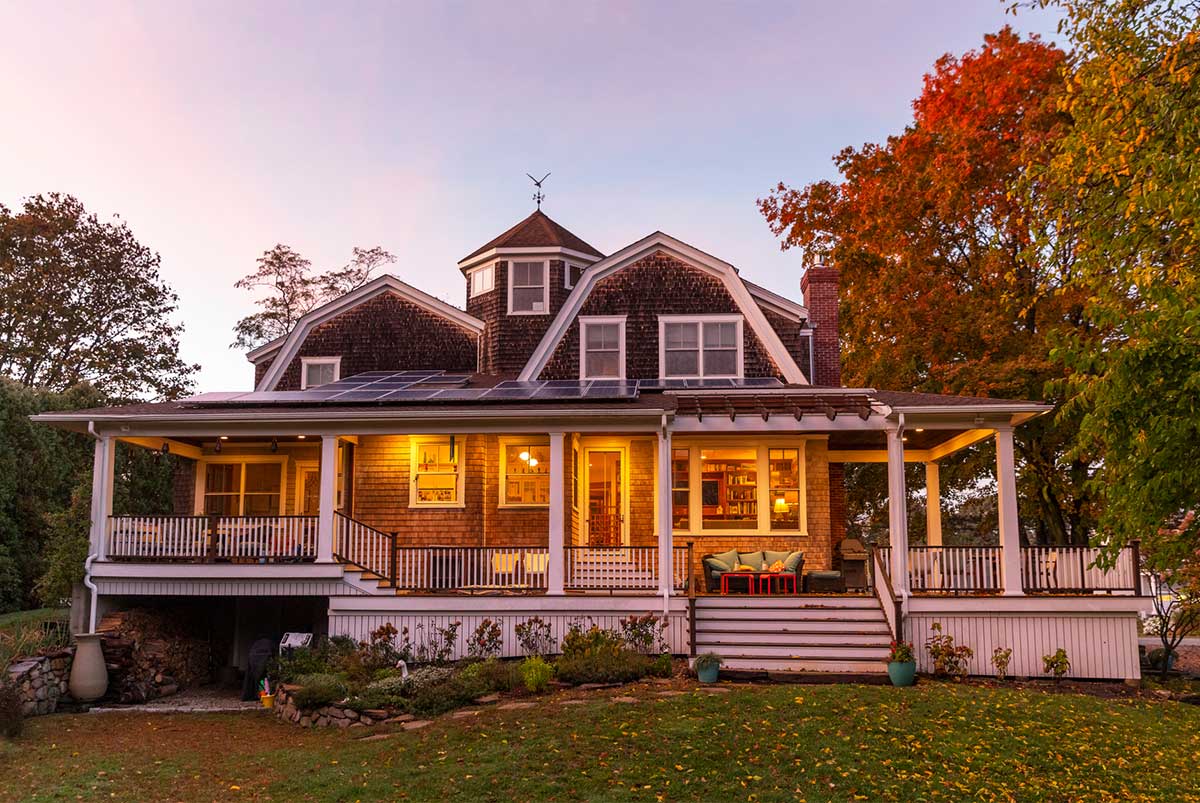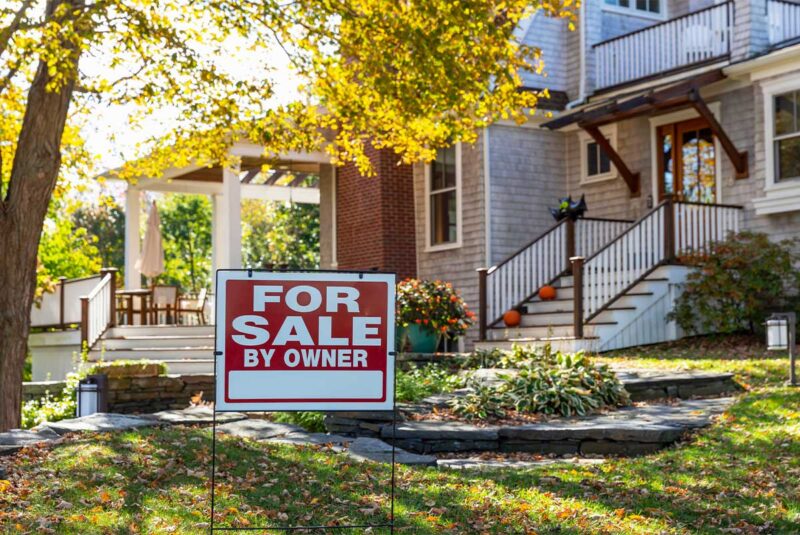Ready To Buy a Home?
Get Approved to Buy a Home
Rocket Mortgage® lets you get to house hunting sooner.
Buying a new home is stressful – so is selling a home. Doing them both at the same time can be overwhelming. We don’t say this to scare you, but we want to be honest about what you’re taking on.
The good news is we’ve broken down buying and selling a house at the same time into seven simple steps. Our goal is to create a manageable action plan for you to follow.
These steps are numbered, but it’s important to remember there’s no one-size-fits-all approach to this. You can do the steps in the order that works best for you – and even skip a step if needed!
What’s important is to make a plan that works for your situation.
1. Prioritize Buying a Home or Selling Your Home
Explore Your Mortgage Options
What are you looking to do?
While the processes for buying and selling homes can overlap, you probably won’t be closing both deals on the same day. Most likely, one or the other will happen first.
There are pros and cons to both methods. It’s worth taking the time to think about your circumstances so you can decide which domino you’d prefer to knock over first.
Buying a new home first
PROS of buying a new home first👍
If you buy your new home first, you’ll have peace of mind knowing where you’re going to live when you move from the old house.
You only need to move once. That means you don’t have to worry about storing your belongings until you find a permanent place or dealing with the struggle of signing a month-to-month lease.
If there’s no ticking clock for when you need to leave your old home, you can spend more time looking for your new one. This means you might not have to settle, even if it takes a little extra time to find the one.
CONS of buying a new home first👎
If you buy a house and can’t sell your old one fast enough, you could be on the hook for two mortgages at the same time. This can quickly wreak havoc on your finances, and if you struggle to sell your old home, this could become a huge problem.
To avoid paying two mortgages, you might rush to sell your old house. This can lead to taking a lower offer than you may have gotten if you’d been able to be more patient.
One way to protect yourself from paying two mortgages is to make your offer on the new house contingent on selling your old one. However, contingent offers are viewed as less competitive, so you might struggle to get an offer accepted.
Selling your home first
PROS of selling your home first👍
If you decide to sell your house before making offers on a new one, you won’t be on the hook for two mortgages.
By prioritizing selling your house first, you can take the time to get the best offer possible. That means you don’t have to settle for an offer just to meet a deadline resulting from buying a new home.
Another benefit of selling before you buy is that you’ll know exactly how much equity you have to put toward your new home. It’ll also be easier to put your profits toward your new purchase.
CONS of selling your home first👎
You’ll probably need to find a temporary living situation while you look for a new house. This can lead to expensive month-to-month rentals, plus the cost of storing your belongings and the stress of moving multiple times.
Just because you’ve sold your home doesn’t mean you’ll find a new one you like. Absence makes the heart grow fonder, and sometimes looking at the housing market can make people appreciate their current living situation.
2. Establish a Timeline
There are many reasons people buy and sell a house at the same time, and they come with different timing concerns. For example, if you got a new job in another state, you’d probably like to have your living situation resolved before you start working.
Whatever your circumstances are, it’s worth taking the time to map out when you need to be in the new home. You can work backward from there to decide how much time you have to get your current home ready to sell.
3. Prepare Your Finances
The trickiest piece of this will likely be getting your financing in order to purchase the new home, especially if you still have a mortgage on the house you’re selling.
Here are some things you’ll want to have a handle on before making your move:
- How much equity you have
- How much liquid cash you have
- How much you’ll need to spend on home repairs to sell
- What mortgages you think you’ll be able to qualify for
Taking the time to understand where you stand financially will help you determine the best path forward.
Where will your down payment come from?
This can be one of the biggest obstacles you’ll need to overcome in the entire process. Here are some common ways people come up with the funds:
- Profits from home sale: If you sell your old house first, you can use the profits as a down payment.
- Home equity line of credit (HELOC): A HELOC lets you borrow money against the value of your house. You can use the funds to make a down payment on the new home and then repay it with the proceeds from selling your old one.
- Bridge loan: You can use a bridge loan to either pay off the old mortgage on the house you’re selling or use it to get the funds for a down payment on the new home.
4. Find a Real Estate Agent or Agents
There are many different ways a real estate agent can help you with both sides of this process.
When it comes to selling your home, a listing agent can help you stage and photograph the home, and they’ll also be responsible for marketing it. While you can list your house as for sale by owner (FSBO), letting the real estate agent handle things like open houses can take a lot of stress off you – especially since you’re doing two stressful things at once.
They’ll also handle things like doing the writeups on the multiple listing services (MLS) and house hunting websites.
When looking for new homes, real estate agents will have access to tools like the MLS and can help you find new properties. They’ll also be able to advise you on the market and pull comps for you, so you feel confident about any offers you make.
If you’re buying and selling in the same area, you can use the same real estate agent for both processes. However, if you’re buying in a different area, you’ll need to use a different agent. Don’t be afraid to lean on them – they should know the new area better than you.
5. Prepare Your Home
Remember, you can do these steps out of order. But we suggest letting your real estate agent advise you on what you need to do to get your home ready to sell – unless you plan to sell as-is.
Consider whether there are any expensive issues with your home that might scare off buyers – for example, a roof that needs to be replaced or an old HVAC system. Even for less expensive potential repairs, your real estate agent can help you understand how these issues might affect the offers you’ll get and if it’s worth it to fix them before listing your home.
They’ll also help you stage your home. They should be able to get you professional photos of your home and many have the capability to set up virtual tours.
6. Research the Market To Sell and Buy
Some people choose to do this step first. If you’re in a position without a ticking clock, this can be a great option because you can decide whether or not you want to go through the process of buying and selling.
However, there are circumstances where moves need to be made, regardless of whether or not the timing is ideal. Even in these instances, you’ll still want to take the time to understand the market dynamics. Your real estate agent can help you, but you need to understand if you’re operating in a buyer’s or seller’s market.
It’s important to know the forces at play because they should dictate your actions to a certain extent. In a seller’s market, you probably won’t need to worry about seller concessions, and you may be able to sell your property for over asking. In a buyer’s market, the opposite might be true.
If you’re staying local, remember that you’ll be buying into the same market you’re selling in. So if you sell your house above the list price, keep in mind you might need to offer over asking to secure your new home.
7. Negotiate Offers
Once your house has been listed with an agent, you’ll be able to receive offers. Remember that everything about the offer can be negotiated, including the closing date. If you know your timeline, then you can ask to close faster or slower as part of the negotiation process. You can also ask for things like rent-back agreements to allow you to stay in the home longer if needed.
Depending on whether you’re prioritizing buying or selling, you might start with the process from a buyer’s perspective – although you’ll do both eventually. This part of the process can be the most stressful because it feels like everything hinges on getting that first domino to fall.
Lean on your real estate agent and trust in the legwork you’ve done to get to this point. But don’t forget to be patient. It can take months to buy a house – or longer in a competitive market.
FAQs about buying and selling a house at the same time
Probably, although stress is relative. Things that can make the process more stressful are tight timelines, back-and-forth negotiations and budget constraints.
When you sell your house, the money from the buyer pays off your mortgage and covers transaction costs. Anything left over is your profit, and many people use that profit as a down payment for their next home.
If you sell your house for a profit, you’ll owe capital gains tax. How much you’ll pay depends on your income, marital status and other factors about the property itself. However, if you use the profits to purchase a new property within a certain time frame, you might be able to defer the tax.
When Selling and Buying a House at the Same Time, Take It Step-by-Step
Our best advice for taking on this challenge is to focus on the individual pieces of it. When you start thinking about all the things you need to do, it can start to seem impossible. Don’t be afraid to ask for help. Your real estate agent can be a critical resource for you during this process.
Take the first step toward buying a home.
Get approved. See what you qualify for. Start house hunting.
The Short Version
- Start by deciding whether you’ll prioritize selling your old home or buying the new one first. There are pros and cons to both approaches
- Figure out where you’ll get the down payment for your new home. It’s common to use the profits from selling your own home as a down payment
- A real estate agent can be a critical ally through both processes. They’ll help you negotiate and advise you on the market




